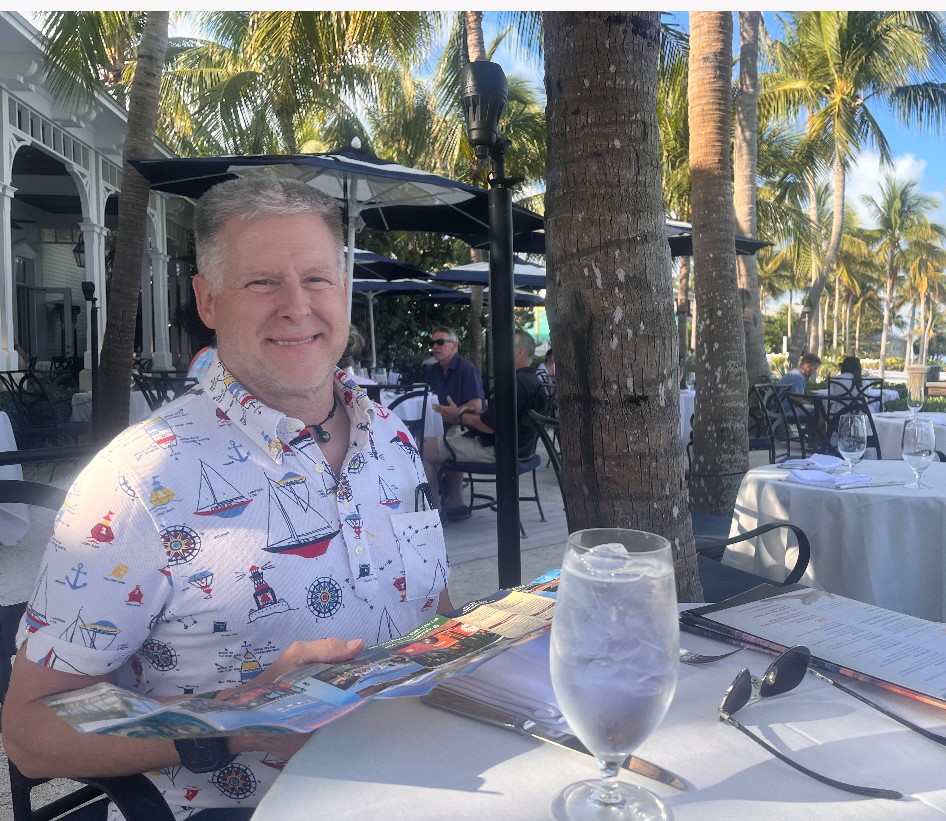
Brian was the first patient in Southern California to have the new FDA-approved implant heart device, GORE® TAG® Thoracic Branch Endoprosthesis at MemorialCare Heart & Vascular Institute at Long Beach Medical Center.
Brian is a husband and father who has a busy career and active lifestyle including working out every day. He didn’t think he’d ever experience a major heart issue.
Like every morning, Brian wakes early to get ready for work, but this particular morning was different than others. He began to experience some sudden chest pains that became more severe. He called 911 and his wife right away. He went straight to the emergency room at an area hospital close to his house.
They were quick to check his vitals and assess his situation. From there, the staff ordered a chest X-ray, blood tests, and then back for a CT scan. The CT showed a type B-aortic dissection that luckily didn’t require emergency surgery.
An aortic dissection is a tear in the inner layer of the aorta, the large blood vessel of the heart, a rare condition with fewer than 200,000 cases per year in United States. An aortic dissection may cause severe chest pain and upper back pain. It is an emergency medical condition that requires immediate attention and may mimic other heart diseases.
For the time being, Brian was given medications to help lower his blood pressure, but that area hospital couldn’t treat his condition any further because they didn’t have a specialized cardiovascular team. He was immediately transferred and referred to the vascular surgical team at MemorialCare Heart & Vascular Institute at Long Beach Medical Center.
It was here that Brian and his wife met with Dr. Ali Khoynezhad, medical director of aortic and arrhythmia surgery and his team at the MemorialCare Heart & Vascular Institute. They moved him up to the Critical Care Unit (CCU) and began working to get his blood pressure and pain under control. He went for another CT scan to verify that nothing had progressed or gotten worse. They were able to stabilize him and send him home after five days in the hospital.
MemorialCare Heart & Vascular Institute offers the least invasive ways to care for complex cardiovascular issues through a minimally invasive first approach with catheters or tiny incisions. Utilizing the least invasive surgical techniques and specialized equipment, its cardiovascular surgeons perform the same lifesaving procedures while avoiding traditional open-heart surgery allowing patients to get back to their lives quicker by saving healthy tissue, reducing scarring and bleeding, and accelerating recovery time.
Dr. Khoynezhad met with Brian again to discuss next steps and informed him he was a good candidate for the implant heart device, GORE TAG Thoracic Branch Endoprosthesis. A few weeks later, Brian would be the first patient to receive the branched stent graft in Southern California at Long Beach Medical Center.
The GORE TAG device is a treatment for complex aortic disease when the arch is involved. Branched stent grafts offer a new, less invasive technique, helping to reduce the patient’s length of stay in the hospital and improve recovery. This innovative and efficient minimally invasive treatment option is proving to be beneficial to patients with aortic disease that would otherwise require open surgical repair and is helping patients recover quickly and resume normal activities much sooner.
The procedure went well, and Brian was moved into a recovery room. Following the implant, the medical team ran additional CT scans and echocardiograms to make sure that the device was intact, the heart was stable, and the heart rhythm was strong, and it was. Brian was able to go home the next day to finish his recovery.
“We are so thrilled with Brian’s progress. Minimally invasive procedures have come a long way over the years and the GORE TAG is one example of an impressive device that can provide tremendous benefits to the patient,” said Dr. Khoynezhad. “Brian’s surgery was almost a year ago and I’m happy to report that we’ve been able to successfully complete the GORE TAG implant device procedure for many other patients.”
Fast forwarding a year later, Brian has had several follow ups with Dr. Khoynezhad and continues to feel great and has resumed all his normal activities. His prognosis continues to be successful. His procedure was so effective that he didn’t require cardiac rehabilitation at the Long Beach Medical Center Cardiac Rehabilitation Program. Brian continues to see his primary care physician at MemorialCare for routine visits and checkups.
While Brian reflected on his experience living with an aortic dissection, he was shocked that this happened to him. “I’ve always been active and physically fit my entire life and this was very unexpected. I have no family history of heart disease or pre-existing health issues. I realized that what happened to me could potentially happen to anyone. I learned that if something doesn’t feel right, don’t put it off or second guess what’s happening and do something about it. Your life could depend on it.”
He continued, “I truly appreciate the quality of the care I received at Long Beach Medical Center, from the doctors and surgeons to the nurses and staff. Every step of the way was focused on my well-being and handled in a very personal and professional manner.”